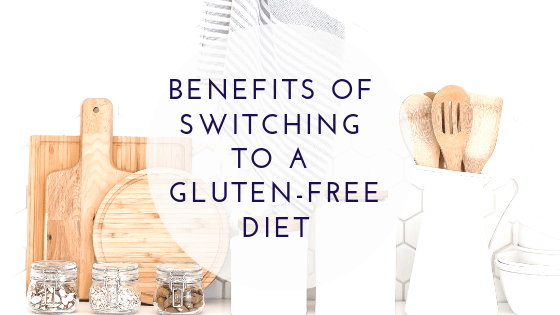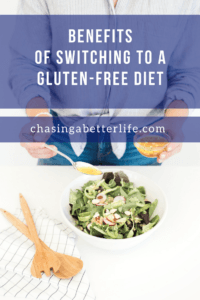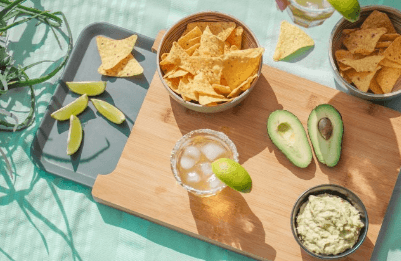Benefits of Switching to a Gluten-Free Diet
Health Benefits of a Gluten-Free Diet
If this is your first time hearing about the wonders of a gluten-free diet, then you might have a lot of questions as to why anyone would want to give up the foods that they love and take on the daily task of removing anything from their diet that contains this little thing called gluten. In the effort to spread information about how living without gluten can help you achieve your health goals, this article has been compiled to share the benefits of switching to a gluten-free diet, whether you have Celiac disease or a gluten intolerance, but other benefits as well.
You Eat Healthy Whole Foods

This post may contain affiliate links, which means I may earn some money if you click on one. Read the full disclaimer here.
Most manufacturing processes can rob you of their nutritional content. Eating foods in their natural state can be a lot more satisfying and filling, and when you eat this way your body will destroy thank you. Most people tend to see the result of this in just a few days because of a remarkable change in their vitality.
Better Digestion
Another great thing about eating gluten-free is that even if you aren’t someone who has been diagnosed with celiac disease, you are likely to experience better digestive efficiency. This can affect a lot of areas in life because who you absorb your food is very important for your health.
Better digestion means that your bowels are less likely to become irritated or inflamed, which could be a large help to people who suffer from IBS or other inflammation issues. Many whole foods that you eat will help keep your intestines clean and free of the plaque that many processed bread products contain, which will improve nutrient absorption, as well as proper elimination.
Prevent Heart Disease

Tips for Starting a Gluten-Free Diet
When you’re beginning a gluten-free diet, it’s important to set yourself up for success, in that you don’t want to allow yourself to get trapped in a corner with unrealistic expectations for yourself. Officials who have changed laws to make it difficult to separate the foods that contain gluten from the ones that don’t have only created more confusion, but you can still put yourself in a position to be protected from these silent assailants. The only question that you might be asking yourself might be, “What do you I need to do if I think I have issues with gluten?”
~PIN IT~
Get a Real Diagnosis
Having a real, actual celiac diagnosis from celiac testing is a good place to start. The worst thing that you can do for yourself is to create a reality where you are suffering from some kind of imaginary illness. This will make it a lot harder to know what is actually causing the problem and send your doctor on chases that don’t have any bearing on your health because they are from the incorrect perspective. Always be as honest and forthcoming with a healthcare professional as you can.
Know What Items Contain Invisible Gluten
Today a lot of companies post the legally acceptable versions of ingredients rather than the actual list of ingredients. That is because companies have the right to lie about or omit important information given to consumers who might not be so excited about purchasing their chemical-laden products. While not totally illegal, these kinds of practices can harm consumer trust, and along with it, ruin the reputation of companies who are willing to engage in such practices. If you become familiar with the multitude of ways that companies hide the less desirable elements in their food, you’ll be better equipped to avoid the hidden gluten that might cause you to have any of the issues mentioned here. Some of these secret names appear as hydrolyzed wheat protein, durum, and modified wheat starch.
Be Open to People Who Are Curious
No one likes getting the 3rd degree when they walk into a room, but when you have a slightly different lifestyle than most people, there are likely to be a few of people who come in contact with you who are going to end up asking about how it all works. If you’re doing a dietary program, it can be really life-affirming to get to share some of your best and most important tips with curious people. This small amount of personal investment can move people to make major changes that benefit them for years to come.
Gluten-free Is More Common Than Before
One of the best things about the spread of information is that a lot of people begin to pick up on important social cues that show them the rules and what kind of interactions are appropriate. Groups and individuals alike have the ability to influence many aspects of the world around them, and this can be seen in the way that many gluten-free people have influenced restaurants to include gluten-free options for their meals at a reasonable price. Now you can dine at your favorite places without being stuck with the baked potato.
Signs You Need to Ditch Gluten
Gluten sensitivity is a relatively rare condition among most adults, but it is still possible that you could be one of the unlucky few who are affected by this condition. There are a host of symptoms that are associated with gluten sensitivity, but there are few symptoms that can be pretty major indicators that you do in fact have a problem with gluten. In the next few paragraphs, you’ll find a few reactions that you can interpret as signs that you need to ditch gluten.
It Affects Your Emotionally
Sometimes your sensitivities can manifest in very strange ways. One way that a lot of people don’t expect is that they may have some kind of emotional reaction after they consume certain foods. Although it’s common to experience a physical reaction such as weight gain, or various types or fluid retention, it’s important to pay close attention to how you are feeling emotional, because even the most irreverent reckless behavior, sudden mood swings, and sudden feelings of apathy could be signs that you have some form of gluten intolerance.
It Changes Your Natural Schedule
Some people with gluten intolerance are affected in ways that are completely unrelated to their digestive systems, but a larger number of people who are unable to process these types of proteins without issue will experience some kind of intestinal distress. This can appear in either the form of diarrhea or constipation. Largely, the dietary addition has disrupted things to the extent that they either refuse to work properly, or they are overactive. It would be a good idea to take a controlled look at what you eat and keep notes on when your issues are triggered so that you know for sure what is causing the problem. A bit of due diligence goes a long way and can save you time by avoiding a misdiagnosis.
You Regret Eating It Because You Become Weak
Sometimes you make a bad pick for a quick meal. That happens to everyone sometimes, but when the food actually robs you of your proper levels of energy, it might be time to consider the nutrition of what you’re eating. The wrong foods can rob you of valuable energy stores or make it difficult for your body to use these fuel tanks once you've ingested the wrong kind of foods. It’s better to avoid foods that make you feel tired in any case, but if you’re not entirely sure, try your best to keep a journal and do controlled experiments.
Your Guts Feel Swollen
One of the biggest signs that you've eaten something that isn’t really right for your body, is that your digestive tracts begin to produce massive amounts of gas when it’s trying to use your food for energy. Gluten can cause some intense bloating if your body has sensitivity issues. Listen to your body. Take good care of it and it will take care of you.
Mistakes to Avoid When Going Gluten-Free
So, you’ve decided to try the gluten-free life. It might be from a gluten sensitivity or allergy, or just because you like the health benefits. At this stage, it’s possible that you’ve taken all of the bready, sweet, salty bread products and tossed them into the trash as you take one last look before you start your new life as a gluten-free person, but as you walk back towards the kitchen, you may find that you really don’t know much about what kinds of foods can have gluten in them before buy them. If you continue reading the next few paragraphs, you’ll find some pointers on which mistakes to avoid when going gluten-free.
The Gluten-Free Learning Curve
If you don’t know anything about how to actually avoid gluten in the multitudes of foods that are mass produced on a daily basis, you might discover that despite all of your changes, you’ve just ended up eating less palatable versions of all of the foods you like, while still eating gluten. The best thing to do is arm yourself with a true knowledge of exactly what foods and brands can contain or become contaminated with gluten at some point. A large portion of people who live with celiac disease are unaware that sauces from the store are often packed full of gluten, which can completely cancel out the work you did to find a gluten-free light beer.
Replacing Your Diet with Gluten-Free Junk
It’s one thing to limit yourself to healthy foods that you can eat fresh, but it’s another to sit and get stuffed on gluten-free junk foods that are intended as treats. These items might not contain much of the gluten that you’re trying to avoid, but still contain a measure of fat, salt, sugar and other additives that are used as preservatives. Food manufacturers are well known for creating products that they can market to people will poor impulse control. If you have a health condition like celiac disease, then it’s more important than ever to find fresh foods to eat. This is one way to be absolutely sure of what you’re eating.
Relying on Processed Foods for Gluten-Free Options
In today’s modern world, a large cross-section of young adults have become accustomed to eating high amounts of processed foods. Unfortunately, these habits can often continue right into a new gluten-free diet routine because gluten-free items exist in nature, but the added value of the words “gluten-free” draw in the curious buyer. The best way to get the nutrients that you need would be to cook your own food and squeeze your own juices. That way you can prevent yourself from allowing any gluten slip past your watchful eyes.
If you'be been curious about going gluten-free or diagnosed celiac, I hope this fills in some of the blanks for you. I would love to hear your thoughts or comments on gluten-free.














